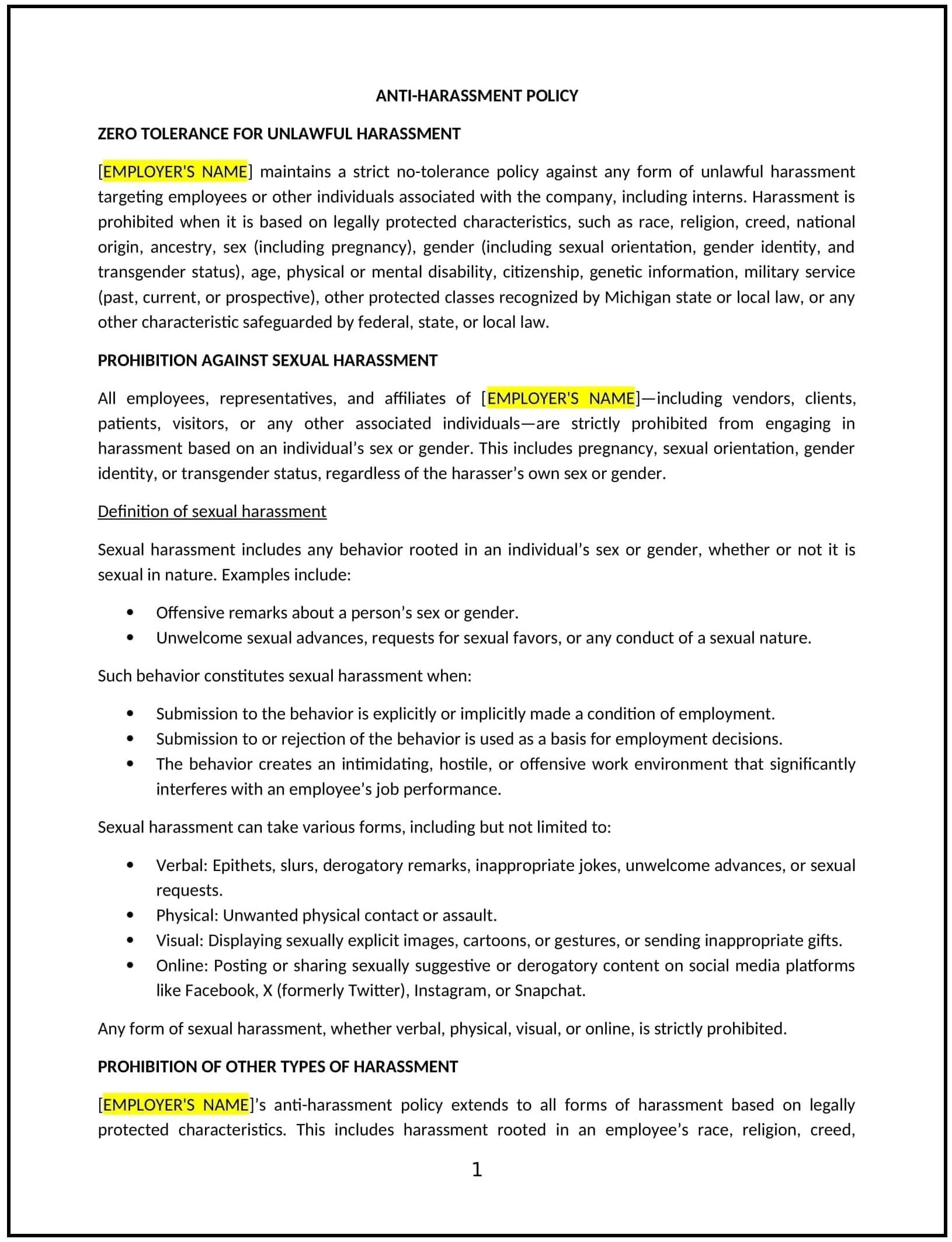Got contracts to review? While you're here for policies, let Cobrief make contract review effortless—start your free review now.

Customize this template for free
Anti-harassment policy (Michigan)
An anti-harassment policy provides Michigan businesses with guidelines to prevent harassment in the workplace, ensuring that employees are treated with dignity and respect. This policy outlines what constitutes harassment, sets expectations for behavior, and provides procedures for reporting and addressing complaints.
By adopting this policy, businesses can foster a safe and inclusive workplace, minimize legal risks, and promote a respectful work environment.
How to use this anti-harassment policy (Michigan)
- Define harassment: Clearly outline what constitutes harassment, including verbal, physical, and visual conduct that creates a hostile or intimidating work environment based on race, gender, sexual orientation, religion, disability, or any other protected characteristic.
- Set expectations for behavior: Emphasize that harassment of any kind is not tolerated and that employees are expected to treat one another with respect and professionalism.
- Establish reporting procedures: Provide clear instructions for employees to report harassment, including how to file a complaint and to whom it should be directed (e.g., HR, supervisor).
- Outline investigation protocols: Detail how complaints will be investigated, ensuring fairness, confidentiality, and timely resolution.
- Include non-retaliation provisions: Ensure employees that they will not face retaliation for filing complaints or participating in investigations.
- Specify disciplinary actions: Outline the potential consequences for employees found guilty of harassment, including warnings, suspension, or termination.
- Promote awareness: Encourage ongoing training and communication about harassment prevention and how employees can create a respectful work environment.
Benefits of using this anti-harassment policy (Michigan)
This policy provides several key benefits for Michigan businesses:
- Promotes a respectful workplace: Helps ensure that all employees feel safe, respected, and valued in the workplace.
- Reduces legal risks: Minimizes the potential for harassment-related claims and lawsuits by addressing issues proactively and adhering to Michigan state and federal laws.
- Enhances employee morale: Fosters a work environment where employees are comfortable and confident, contributing to higher morale and productivity.
- Supports compliance: Aligns with Michigan state laws and federal regulations regarding workplace harassment, ensuring the business operates within legal frameworks.
- Builds trust: Demonstrates the business’s commitment to providing a fair and supportive workplace, building trust with employees and customers.
Tips for using this anti-harassment policy (Michigan)
- Communicate the policy: Ensure that all employees understand the policy by including it in employee handbooks, displaying it in common areas, and providing regular reminders through training.
- Provide regular training: Offer mandatory training sessions on harassment prevention, including how to recognize and report harassment.
- Enforce the policy consistently: Ensure that all employees, regardless of position, are held to the same standards when it comes to preventing and addressing harassment.
- Monitor the workplace environment: Regularly assess the work environment to ensure that harassment is not occurring and that employees feel safe.
- Review periodically: Update the policy as needed to reflect changes in Michigan laws, company needs, or best practices for preventing workplace harassment.